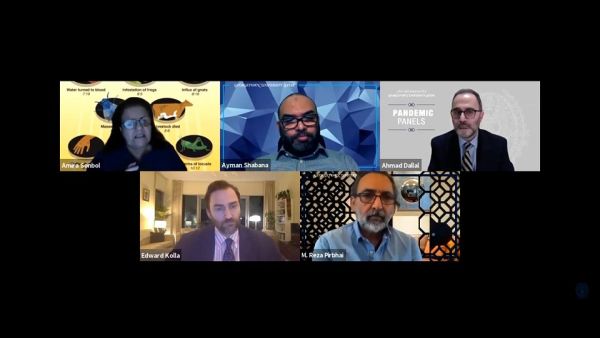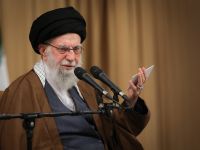QF: Georgetown Pandemic Panels Harness Expertise at QF to Discuss Road to Recovery-80

Top scholars from Georgetown University in Qatar (GU-Q) in the fields of history, political science, ethics, Gulf studies, and theology have come together to examine the most pressing issues of the COVID-19 crisis through a series of virtual panel discussions hosted by GU-Q’s dean, Dr. Ahmad Dallal. The Pandemic Panels aim to engage the QF partner’s faculty members in analyzing historical precedents, policy impacts and relevant ethical issues surrounding the COVID-19 response, in order to contribute to the construction of an evidence-based road to recovery from the pandemic.
Reflecting on key outbreaks of emerging infectious disease and other threats to national security in the past, the Pandemic Panels examine how these events inform the current crisis. Over the three part series, issues examined include how political and economic systems are being reshaped as a result of the crisis, and the impact on ethics, global trade, access to resources, and the balance of individual liberty and public welfare in light of the response measures needed to contain the viral outbreak.
Higher education institutions have an important role to play in the response to the crisis, explained Dr. Dallal, who moderates all three panels in the series. “Knowledge and education are essential to recovery from the current global crisis, and are the very foundation of human wellbeing. Factual evidence and fact-based decisions are the foundations of our human strength, and resilience, and welfare.”
He adds that while experts look to the past to understand the biological origins of an emerging infectious disease, a study of history is also required for any understanding of the social, political, and economic repercussions of pandemics. “We hope this forum will constructively channel the intellectual energies of the participants to better inform the general public and reflect on not only how we got here, but also where we need to go next, and most importantly, what that road to recovery might look like.”
In the first panel, The COVID-19 Pandemic: Historical and Cultural Perspectives, Associate Professor M. Reza Pirbhai, who specializes in South Asian and World History, discussed the bubonic plague outbreak that affected south Asia in the late 1800s. At the time, British colonial authorities set up a plague committee and relied on expert input, implementing a series of measures that Dr. Pirbhai notes were similar to the national responses to the crisis today.
The second panel, Governance In A Time Of Pandemic: A Global View, draws the connections between national and global strategies and responses, and the third panel, Regional Concerns In Pandemic Recovery, brings the expert focus back onto the response and path to recovery for Qatar and the Middle East.
The GU-Q Pandemic Panels including a full list of the participating scholars are available for viewing on the university’s website.
Background Information
Georgetown University in Qatar
Established in 1789 in Washington, DC, Georgetown University is one of the world’s leading academic and research institutions. Georgetown University in Qatar (GU-Q), founded in 2005 in partnership with Qatar Foundation, seeks to build upon the world-class reputation of the university through education, research, and service. Inspired by the university’s mission of promoting intellectual, ethical, and spiritual understanding, GU-Q aims to advance knowledge and provide students and the community with a holistic educational experience that produces global citizens committed to the service of humankind.
Located in Doha’s Education City, GU-Q offers the same internationally recognized Bachelor of Science in Foreign Service degree as Georgetown’s Capitol Campus in Washington, DC. This unique, interdisciplinary program prepares students to tackle the most important and pressing global issues by helping them develop critical thinking, analytic, and communication skills within an international context. GU-Q alumni work in leading local and international organizations across industries ranging from finance to energy, education, and media. The Qatar campus also serves as a residency and delivery location for the Executive Master’s in Emergency and Disaster Management along with the Executive Master’s in Leadership.
Qatar Foundation
Qatar Foundation (QF) is a non-profit organization made up of more than 50 entities working in education, research, and community development.
Our unique ecosystem—supported by partnerships with leading international institutions—is built on initiatives that address our most pressing challenges, create global opportunities, and empower people to shape our present and future.






